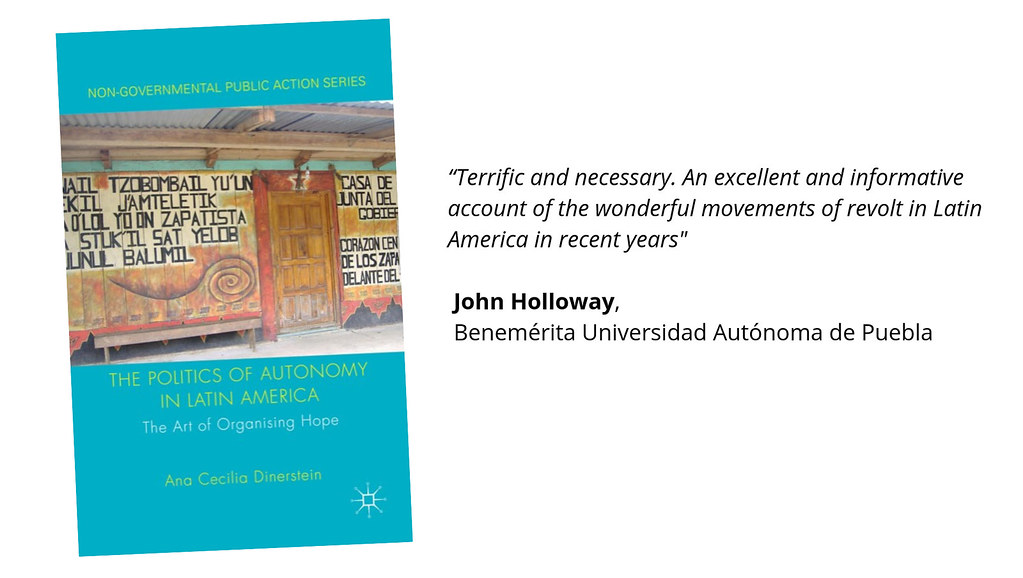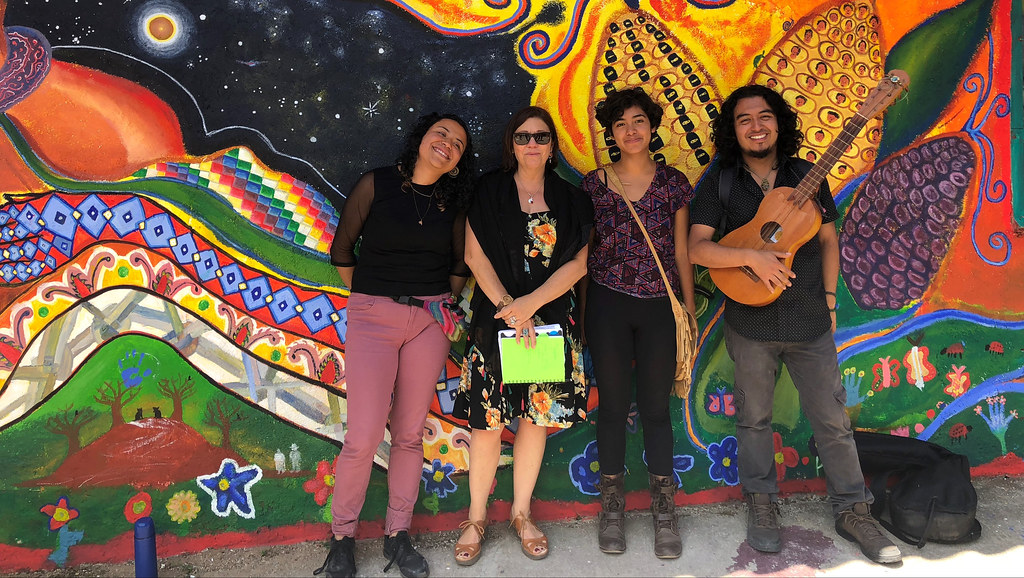To observers, UK and international politics at the end of 2018 seemed in a pretty hopeless place. A failure to tackle deep-rooted, domestic challenges, exacerbated by ingrained party politics and a UK legislature blocked by Brexit, coupled with major, ongoing, seemingly intractable global issues, not least on climate change and the refugee crisis. For those hoping for a better world, 2018 could seem a dispiriting time.
Yet amid the turmoil, a small but growing movement, united behind a different type of politics was seeking to buck that trend. Inspired by a seminal book written by Bath sociologist, Dr Ana Cecilia Dinerstein, social movements and small action groups and collectives were emerging in both Latin America and in Europe.
Her thesis, ‘The Politics of Autonomy in Latin America: The Art of Organising Hope’, an academic text written three years previously, was reaching a new, non-academic audience who felt side-lined by mainstream politics, hungry for change but in need of a blueprint to make it happen.
Channelling progressive movements

“This book gave me an opportunity to bridge what’s happened in Latin America, and now across Europe”, she explains. Focussed on four progressive movements, the text looks at how autonomous social movements - those separate from the state - can organise, press for change, and consider alternative futures.
Taking its cue from events that unfolded in Argentina, Bolivia, Brazil and Mexico, the book explores how: ‘[A]n explosion of rage and hope erupted and expanded throughout the Latin American region at the end of the twentieth century.’ It asks readers to consider how applicable these events – which ranged from tackling land rights to gender rights issues - could be for other parts of the world.
“What I do in the book is to connect autonomous organising – let’s say people getting together to organise a farm, a co-operative, or even grouping together to defend a school becoming an academy - with the concept of hope to show that a collective search for alternatives has a real possibility of producing change", Ana Cecilia says.
A critique of capitalism, colonialism and patriarchy, the book distinguishes between two notions of ‘utopia’ - ‘concrete utopias’ and ‘abstract utopias’ – as a way to help individuals and collectives to map out the tangible 'concrete' changes they want to see and move towards a better future. Her ideas draw from social philosopher, Ernst Bloch. It’s a concept that’s clearly got legs.
“I coined the term ‘The Art of Organizing Hope’ as a tool to make sense of how action groups and movements could set a different course for the politics and societies they really want”, she says. In the second half of 2018, Ana Cecilia was invited to participate in two major events: one in Puebla, Mexico; the other in Ghent, Belgium, Both were planned separately by academics, activists and artists inspired by her work.
Leading a progressive charge
Over one week in Puebla last summer, 100 people from a network of rural universities, community organisations, cooperatives and action groups came together to consider how these ideas could be beneficial in making changes for their rural communities. Part political discussion and debate, part creativity, a key component to the event was also how art – from murals to music – could be used to give content to the idea.
The most recent event in Ghent, an Alternative European Summit, followed a similar format but with an important element of public engagement. Academics, artists and activists selected by Belgium Arts Organisation Victoria Deluxe, embraced and discussed the meaning of the art of organising hope for Europe, but the event also included developing new ‘Narratives for Europe’. This was designed to advocate for brand new, more progressive policies for Europe; ones where human dignity and respect trump ever-increasing profits.
As the organisers explain: ‘This summit is not about party politics …or just an opportunity to complain collectively – therapeutic as this might be – but to develop principles of public intervention that can touch the hearts and minds of people far beyond the rooms we are working in.’
Ana Cecilia adds: “These events were both about taking forward the ideas from my book in practical terms, depicting the challenges people faced and their vision for alternative realities. It was incredible to see the interest.”
In mid- January she will be back in Ghent, taking forward ideas from the project which will next develop into a public multimedia production, performance and exhibition. There are already plans to tour this in four European cities - Dublin, Coimbra, Ljubljana, and Sofia - over the course of the year and beyond.
Changing perceptions of ‘hope’
But having researched and written on this topic for a number of years, why the sudden interest now? She suggests that with the current system of politics found wanting across so many countries and in so many areas, a collective sense of hopelessness has acted as a catalyst for change. She reflects on the “extraordinary moments when people decide fear is not working for them anymore, where it gives way to another important human feeling that of hope.”
And how does she respond to people who might judge talk of ‘hope’ in politics with derision? “Yes, people can be cynical towards this. Hope can seem a hard concept to grasp but, in my view, people are cynical because either they believe the world is alright, or they believe that everything is so bad that there is no hope. They fear a worse future and, thus, they produce more hopelessness.”
Inspiring new change-makers
As someone who grew up under the military junta in Argentina in the late 1970s, Dr Dinerstein knows too well what it is to feel hopeless in a system which seems to be working against the people. In spite of current challenges, she is hopeful that new forms of collective action will help to give ordinary people a stronger voice to become the change-makers in a world in crisis.
She ends: “Hope is not just the ability to fantasise, but a tool for taking alternative realities seriously so that they might actually become possible. With hope, we can make concrete preparations for new ways of organising our societies.
“We’ve been told we can’t do anything about anything and this has created hopelessness, but hopelessness is socially constructed. For me, the art of organising hope is about rejecting this and searching out new potentials for all of us.”
